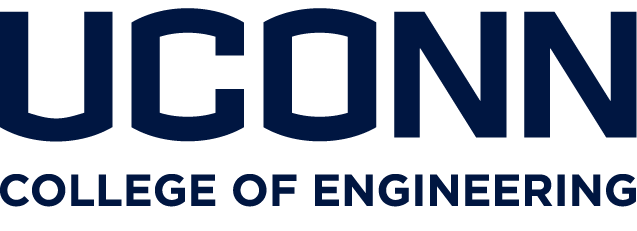AMES Program Curriculum and Admissions Requirements
Participating Faculty:
Ugur Pasaogullari (Program Director)
Avinash Dongare (Advanced Materials Concentration Lead)
Ioulia (Julia) Valla (Processing Concentration Lead)
Liang Zhang (Sensing and Controls Concentration Lead)
Wilson Chiu
Stoyan Bliznakov
Jasna Jankovic
Radenka Maric
Thanh Nguyen
Hongyi Xu
Ravi Gorthala
Naba Karan
Admission Requirements
CGPA (or last two years GPA) of 3.0 or higher,
Equivalent of United States Bachelors degree in Engineering or related fields,
(For international applicants) TOEFL Score of >79, IELTS >6.5, PTE >53
For further information, https://grad.uconn.edu/admissions/admission-requirements/
Application
Apply online at https://grad.uconn.edu/admissions/apply-to-uconn/#application
A personal statement (or research writing sample), official transcripts, and contact information for (3) references are required.
Curriculum & Program Outline
Required Credit Hours
A total of 30 credit hours after the B.S. is required, including 21 credits of advanced course work and successful completion of a thesis. Thesis research is equivalent to 9 credit hours. The thesis must be an original and significant contribution to the field of engineering science and must be defended orally according to Graduate School requirements.
Plan of Study
The student’s plan of study should be prepared with the aid and approval of the advisory committee and be approved by the AMES Director and the Executive Committee of the Graduate Council. All students must have a plan of study on file at the Graduate School and the AMES program. All AMES students must complete three core courses and select an area of concentration: Advanced Materials, Processing, or Systems and Controls. The area of concentration determines the additional requirements to be satisfied. To be approved, the plan of study must include the following coursework:
- Three AMES common courses:
- AMES 5101. Engineering Analysis (3 credits)
- AMES 5111. Computer Aided Engineering (3 credits)
- AMES 5121. Engineering Communication (3 credits)
- Two core courses (6 credits) corresponding to the chosen area of concentration:
- Advanced Materials:
- MSE 5001. Introduction to Material Science and Engineering (3 credits)
- MSE 5322. Materials Characterization (3 credits)
- Processing:
- ME 5130. Advanced Heat and Mass Transfer (3 credits) or CHEG 5311 Transport Phenomena (3 credits)
- CHEG 5321. Reaction Kinetics (3 credits)
- Sensing and Controls:
- Advanced Materials:
- A minimum of 2 elective courses (6 credits) from the list of elective courses for each area of concentration.
Elective courses taken outside of the provided list of courses must be approved by the student’s advisory committee and the program director in advance.
- Nine credits of thesis research (GRAD 5950), as stipulated in the Graduate Catalog (Plan A).
M.S. Final Examination
An oral examination (often called the thesis defense) is conducted based on thesis research. The decision as to whether the student passes the examination is based on a vote of the advisory committee.
Elective Courses
Advanced Materials
A minimum of two elective courses (6 credits) from the following list are required.
ECE 5211. Semiconductor Devices and Models
ECE 5212. Fundamentals of Opto-Electronic Devices
ECE 5223. Nanophotonics
ME 5190. Advanced Solid Mechanics
ME 5210. Intelligent Material Systems and Structures
ME 5410. Theory of Elasticity
ME 5412. Wave Propagation in Continuous Media
ME 5415. Advanced Dynamics
ME 5420. Mechanical Vibrations I.
ME 5421. Mechanical Vibrations II
ME 5422. Advanced Analysis of Composite Materials and Structures
MSE 5310. Modeling Materials I
MSE 5320. Modeling Materials II
MSE 5311. Mechanical Properties of Materials
MSE 5364. Advanced Composites
Processing
A minimum of two elective courses (6 credits) from the following list are required.
ME 5110. Advanced Thermodynamics
ME 5120. Advanced Thermo-Fluids I
ME 5140. Heat and Mass Transfer in Multiphase Systems
ME 5311. Computational Methods of Viscous Fluid Dynamics
ME 5320. Flow of Compressible Fluids I
ME 5321. Flow of Compressible Fluids II
ME 5341. Radiation Heat Transfer
ME 5511. Principles of Optimum Design
ME 5895. Fuel Cells
ME 6170. Combustion and Air Pollution Engineering
CHEG 5336. Optimization
CHEG 5352. Polymer Properties
CHEG 5395. Investigation of Special Topics
ECE 5101. Introduction to System Theory
ECE 6103. Nonlinear System Theory
ECE 6161. Modern Manufacturing System Engineering
ECE 6437. Computational Methods for Optimization
Sensing and Control Track
A minimum of two elective courses (6 credits) from the following list are required.
AMES 5441. Reliability Engineering
AMES 5461. Production Systems Engineering for Energy Efficient Manufacturing
AMES 5451. Optimization Based Production Management
ECE 5530. Modeling and Control of Electric Drives
ECE 6141. Neural Networks for Classification and Optimization
ME 5160. Theory and Design of Automatic Control Systems
ME 5440. Computer Integrated Manufacturing Systems
ME 6260. Advances in Control Systems Design
Learning Outcomes
- Understand and solve advanced engineering mathematical problems using Linear Algebra, Differential Equations, Transformations, State variables and probability;
- Become familiar with computational methods and computer tools used in analysis and design of materials, processes and systems, and be able to choose the correct computational approach, tool and method for various engineering problems;
- Develop communication objectives, develop and analyze written materials in various formats, and plan and deliver presentations;
- Improve the ability to function effectively on project teams, and the ability to manage (interdisciplinary) project teams;
- Understand the fundamental principles of physics and chemistry relevant to their area;
- Formulate and solve engineering problems in advanced manufacturing for energy systems;
- Be able to identify and use appropriate tools in solving relevant engineering problems;
- Be able to follow and implement recent engineering developments in their field.

